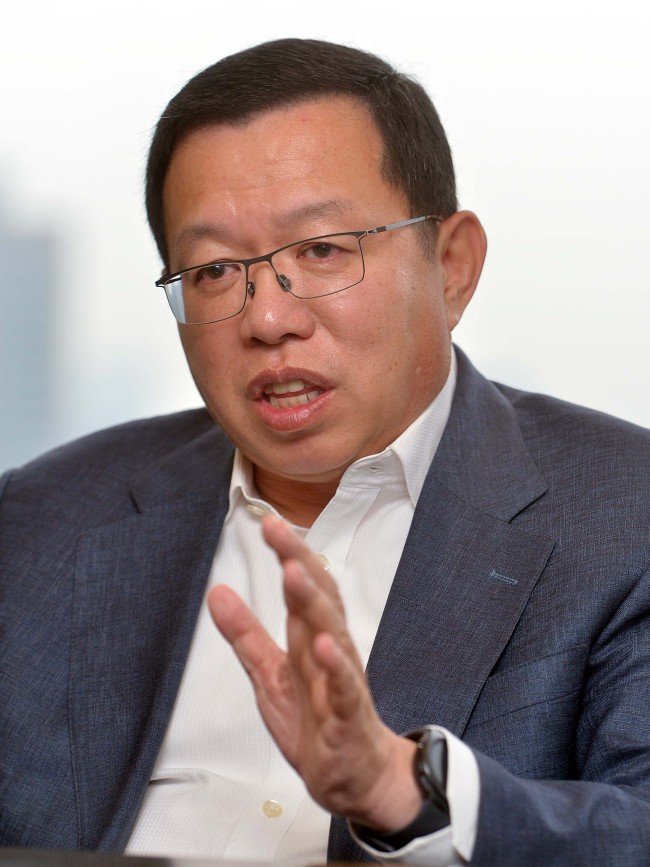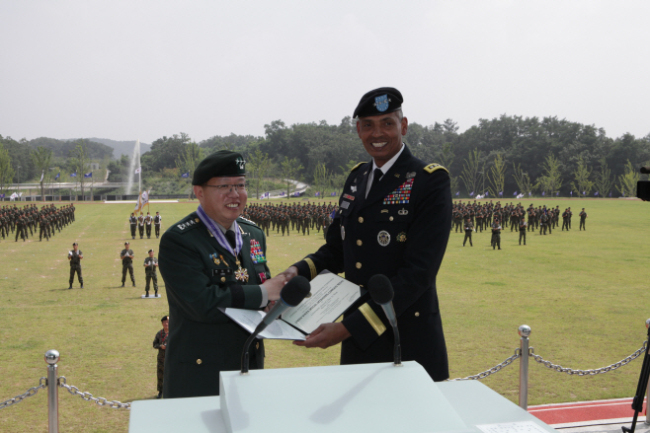On Oct. 9, 1983, a bomb went off at a national cemetery in Yangon, Burma, where scores of top South Korean government officials were waiting for the arrival of President Chun Doo-hwan.
The attack, perpetrated by South Korea’s communist neighbor, brethren and foe North Korea, claimed 17 lives, including Seoul’s deputy prime minister, foreign minister, commerce minister and chief presidential secretary.
Twenty-five-year-old 1st Lt. Chun In-bum, not related to the president, was just meters away from the blast scene, as an aide-de-camp to the chairman of the Joint Chiefs of Staff.
 |
Chun In-bum, a retired army lieutenant general who served in various posts, including commander of the Republic of Korea Special Warfare Command (Lee Sang-sup/The Korea Herald) |
Upon the explosion, he rushed to the chaotic scene, found his boss severely injured and took him to hospital. The military’s highest ranking man later said he owed his life to Chun.
This July, the army officer, who decades ago got his first real glimpse of the type of threat his country was under, ended his 39-year illustrious career with 11 army medals under his belt.
Now 58 and retired as a lieutenant general, Chun says what first comes to his mind when it comes to defending the nation is the very basics of a military’s raison d’etre.
“Instead of spending 2 or 3 million dollars on sophisticated weapons such as missiles, the basic soldiers need to have better equipment, like first aid kits, compasses, protective gear and binoculars -- little things,” the retired general said in English in a recent interview with The Korea Herald.
Refining soldiers’ combat capacity should be the highest priority for any armed forces, particularly for South Korea, which is technically still at war with the North. In reality, however, what is the most important is often taken for granted or neglected.
For Chun, nothing -- even the military’s own rules or conventional wisdom -- comes before it.
During his stint as the commander of Special Warfare Command, he famously snubbed a rule that banned the use of privately purchased gear for the special forces and allowed his men to use high-tech night vision devices from private vendors -- only if they could help soldiers prevail in battle.
Chun led the SWC between 2013 and 2015. He takes most pride in that the average size of the thighs of the special forces grew by 1 centimeter under his leadership.
Many military experts credit him for turning the SWC into an even more combat-ready and combat-capable unit.
In person, Chun is a slight man with a disarming smile, but unmistakable inner strength and toughness. He is eloquent and witty, but knows when to stop talking.
Since retirement, several anecdotes of his unusually down-to-earth style have been circulated on social media. One of them has him giving a salute to conscripts -- young enough to be his sons -- finishing their military duty in a show of respect for their service to the nation. In a photo widely circulated around the internet, he is seen among rank-and-filers shoveling snow.
Chun hopes to see more respect for the nation’s soldiers -- both from within the Army and outside -- in a society where military duty does not attract as much respect as in other countries.
“The military needs to realize that we need to earn the respect of our men,” he said. “There are some really bad apples, but the Army tries to weed them out as much as possible,” he said.
 |
Gen. Chun In-bum is awarded a medal of the United States Special Operation Command by US Forces Korea Cmdr. Vincent Brooks during his retirement ceremony in July this year. He is the first Korean solider to receive the honor. (Photo provided by Chun) |
On the talk, mostly engaging politicians, of changing the country’s military recruitment system into voluntary enlistment, he said from his own experience that conscription is right for the country, but it requires some changes.
Currently, all South Korea’s abled-bodied men between the ages of 18 and 35 must serve in the military for about two years.
There is no “incentive” to attract the young people into a job that only pays minimum wage, Chun said, refuting voluntary enlistment.
“A mixture of a conscription and a professional voluntary force is probably the answer,” he said. “Those troops at the DMZ (Demilitarized Zone) that have less freedom should have a shorter term of service, while the troops in the rear areas should have longer terms with more leave. I think that’s fair.”
On sensitive defense issues like the deployment of the US’ Terminal High Altitude Area Defense batteries and nuclear armament for self-defense, he stressed that policymakers should ask “smart questions” before making a decision, because those issues quite often carry significant impacts on neighboring countries, but are highly politicized domestically.
While acknowledging the need to seek more enhanced defense capability, he also said the policymakers should carefully consider “prices” attached to it.
“THAAD would increase defensibility of ROK (South Korea) and its allies, (but) our neighbors are threatened by this defensive system and they convince themselves for whatever reasons the weapons are against their interest. That part I hope the politicians have taken into consideration,” he said.
“Korea is probably one of the (countries) who (most) has real good reason to have nuclear weapons, (but) the price for this is going to be the end of mutual defense treaty with the US; our status in the world community will be drastically changed. If the Korean people are willing to pay these prices, that’s fine,” he said.
Much of Chun’s military career was devoted to combined operation with the US. Known as one of few in the South Korean military with a global perspective and language skills, Chun spearheaded diverse bilateral businesses, including the establishment of the first-ever combined division in 2015. (As a child, he lived in the US for five years with his mother, Korea’s first female career diplomat.)
The current status of the ROK-US alliance, he said, is “at the best” that he has seen in his military career and would stay so -- even if Republican presidential candidate Donald Trump, apparently critical of current arrangements of the alliance, were to be elected in the US presidential election next month.
“As in all political elections, politicians can say things during the campaign. What really happens after they are elected is another matter,” he said “I’m sure whoever becomes president, he or she will soon realize that it is not one-sided, but mutually beneficial,” he said.
Among his dreams is to one day invite North Korean generals to Osan Air Base, where South Korea and the US are running a combined command.
“If they saw Osan Air Base, they would go back and realize that there’s no way they could win. That’s how confident I am.”
By Yeo Jun-suk / (
jasonyeo@heraldcorp.com)





![[Herald Interview] 'Trump will use tariffs as first line of defense for American manufacturing'](http://res.heraldm.com/phpwas/restmb_idxmake.php?idx=644&simg=/content/image/2024/11/26/20241126050017_0.jpg)


![[Health and care] Getting cancer young: Why cancer isn’t just an older person’s battle](http://res.heraldm.com/phpwas/restmb_idxmake.php?idx=644&simg=/content/image/2024/11/26/20241126050043_0.jpg)
